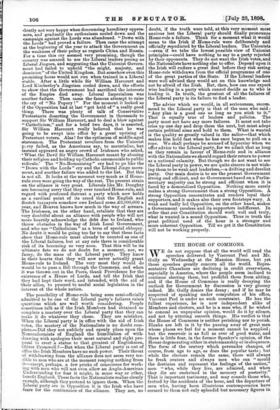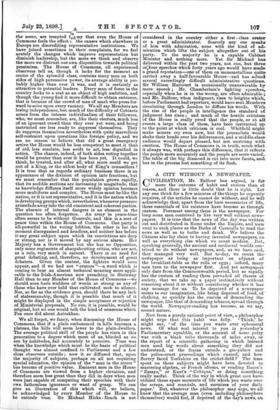THE HOUSE OF COMMONS.
WE do not suppose that all the world will read the speeches delivered by Viscount Peel and Mr. Gully on Wednesday at the Mansion House, but yet those speeches greatly concern all the world. Repre- sentative Chambers are declining in credit everywhere, especially in America, where the people seem inclined to continue electing them, but prohibit them from sitting, and if the House of Commons is really decaying the outlook for Government by discussion is very gloomy indeed. Mr. Gully denies the decay ; and if he may be suspected of speaking under compulsion of his office, Viscount Peel is under no such constraint. He has the fullest experience, he is now independent alike of Members and electors, and he is a man who, if he wished to conceal an unpopular opinion, would do it by silence, and not by uttering smooth things. His verdict is that the House of Commons is neither perishing nor to perish. Blanks are left in it by the passing away of great men whose places we feel for a moment cannot be supplied ; but the reservoir is as full as ever of good water, and there is little fear, in the former Speaker's opinion, of the House degenerating either in statesmanship or ineloquence. The form of the oratory which persuades changes, of course, from age to age, as does the popular taste ; but while the electors remain the same, there will always be fresh orators and always men who can "mould the destinies and represent the feelings of the nation," men "who, while they live, are admired, and when they die are enshrined in the memory of posterity." That is important testimony, and may console those who, fretted by the accidents of the hour, and the departure of men who, having been illustrious contemporaries have seemed to them not only splendid but necessary figures in "5 the scene, are tempted t,eaiay that even the House of Commons feels the effect (, the causes which elsewhere in Europe are discrediting representative institutions. We have joined sometimes in their complaints, for we feel acutely the changes which improve representation but diminish leadership, but the more we think and observe the more we distrust our own disposition towards political pessimism. The House of Commons, all experienced observers tell us, though it lacks for the moment an orator of the splendid class, contains many men on both sides of high persuasive power, its average ability is pro- bably higher than ever it was, and it is certainly as attractive to potential leaders. Every man of force in the country looks to a seat as an object of high ambition, and though the young find it more difficult to obtain entrance, that is because of the crowd of men of mark who press for. ward to seize upon every vacancy. We all say Members are losing independence, but much of the difficulty of Cabinets arises from the intense individualism of their followers, who, we must remember, are, like their electors, much less of an ignorant crowd than they ever yet were, and being instructed are less ready to suppress themselves. They do suppress themselves nevertheless with quite marvellous self-restraint upon questions like foreign policy, and we see no reason to believe that did a great emergency arrive the House would be less competent to meet it than of old, less resolute, less swift to act, less dignified in action. The chance, indeed, of both sides voting together would be greater than ever it has been yet. It could, we think, be trusted, and after all, what more could we get out of a King, or the ablest body of King's counsellors ? It is true that as regards ordinary business there is an appearance of the division of opinion into fractions, but we must remember that the population grows rapidly, that its audible sections are increasing in magnitude, that as knowledge diffuses itself more widely opinion becomes more multiform and complex. The House must be like the nation, or it is not representative, and it is the nation which is developing groups which, nevertheless, whenever pressure arises fade away into the old consistent and coherent parties. The absence of internal dangers is an element in the question too often forgotten. An army in peace-time often seems to be without Generals, and this is a sort of peace time within the House of Commons. One party is all-powerful in the voting lobbies, the other is for the moment disorganised and headless, and neither has before it any great subject upon which its convictions are deep or strong, nor is it moved by any serious alarm. Her Majesty has a Government but she has no Opposition, only some regiments of sharpshooting critics, who are not, as a rule, very much in earnest. There is no need for great debating, and, therefore, no development of great debaters. Given the contest, the fighters would soon appear, and if we had not "orators "—a word which is coming to bear an almost technical meaning more appli- cable to the Irish-American now preaching in Steinway Hall than to any Member of the House of Commons—we should soon have wielders of words as strong as any of those who have ever held that cultivated mob to silence. Nor, so far as the evidence goes, should there be any lack of statesmanship, though it is possible that much of it might be displayed in the simple acceptance or rejection of Ministerial proposals. No one, it is possible, would be original, but no one would talk the kind of nonsense which Fox once did about Astrakhan.
We all forget, we fancy, when discussing the House of Commons, that if a plain embosomed in hills becomes a plateau, the hills will seem lower to the plain-dwellers. The average political skill of the people has risen in this generation to a degree which most of us, blinded as we are by habitudes, fail accurately to perceive. Time was when the knowledge which must be the basis of political thought was almost confined to Parliament and a few close observers outside ; now it so diffused that, upon the majority of subjects, perhaps on all not requiring special education, the opinion of the "man in the street" has become of positive value. Eminent men in the House of Commons are viewed from a higher elevation, and therefore seem less great than they did in days when men were just capable of comparing their speeches with their own fathomless ignorance or want of grasp. We can give an illustration of this which will, we believe, be acknowledged by every Member of the House to be entirely true. Sir Michael Hicks - Beach is not considered in the country either a first - class orator or a great administrator. Scarcely any one speaks of him with admiration, none with the kind of ad- miration which lifts the subject altogether out of his party. To the majority he is a capable Cabinet, Minister and nothing more. Yet Sir Michael bas delivered within the past two years, not one, but three,' or:four speeches which forty years ago would have made a grand reputation—one of them on monometallism quits. carried away a half-favourable House—and has solved several exceedingly difficult administrative questions. Sir William Harcourt is occasionally unanswerable by mere speech ; Mr. Chamberlain's fighting speeches, especially when he is in the wrong, are often admirable; and Mr. Balfour, when indignant, rises to heights which, before Parliament had reporters, would have sent Members circulating through London to diffuse his words. With the rise of the people in intelligence the standard of judgment has risen ; and much of the hostile criticism of the House is really proof that the people, Or at all events a large class of them, have been instructed top to the point at which criticism is cool. Whitfield might make miners cry even now, but the journalists would shake their heads over his deliverances, and a middle-elass, audience would depart pleased, but not unstrung with emotion. The House of Commons is, in truth, much what it always was, with perhaps this difference, that it reflects the people more accurately and the people are more varied_ Thetable of the big diamond is cut into more facets, andi has in the process lost something of its flash.



































 Previous page
Previous page